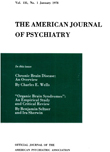ELECTRIC CONVULSIVE THERAPY AFTER TEN YEARS OF PHARMACOTHERAPY
Abstract
The conclusions from this survey are obvious. Even though modern drugs represent an enormous progress in psychiatry and have increased the number of treatable patients immensely, they have not replaced previous treatments including ECT. Pharmacotherapy has undoubtedly contributed to the great strides made by social psychiatry, but it has been shown by various authors that in some countries these new developments in mental hospitals preceded the introduction of drugs. It was the purpose of this paper to counteract a trend frequently observed in psychiatry to discard established treatments in favor of newer ones. The original overenthusiasm for the new drugs 10 years ago was unjustified. It would be equally unjustified if some present disappointments should lead to their discreditation; but there is no reason to neglect any of the previously available methods. In this paper the indications of pharmacotherapy and ECT have been discussed. It was our aim to show that some indications overlap, that others differ and that judicious use of both methods is necessary for optimal therapeutic results.
Access content
To read the fulltext, please use one of the options below to sign in or purchase access.- Personal login
- Institutional Login
- Sign in via OpenAthens
- Register for access
-
Please login/register if you wish to pair your device and check access availability.
Not a subscriber?
PsychiatryOnline subscription options offer access to the DSM-5 library, books, journals, CME, and patient resources. This all-in-one virtual library provides psychiatrists and mental health professionals with key resources for diagnosis, treatment, research, and professional development.
Need more help? PsychiatryOnline Customer Service may be reached by emailing [email protected] or by calling 800-368-5777 (in the U.S.) or 703-907-7322 (outside the U.S.).



